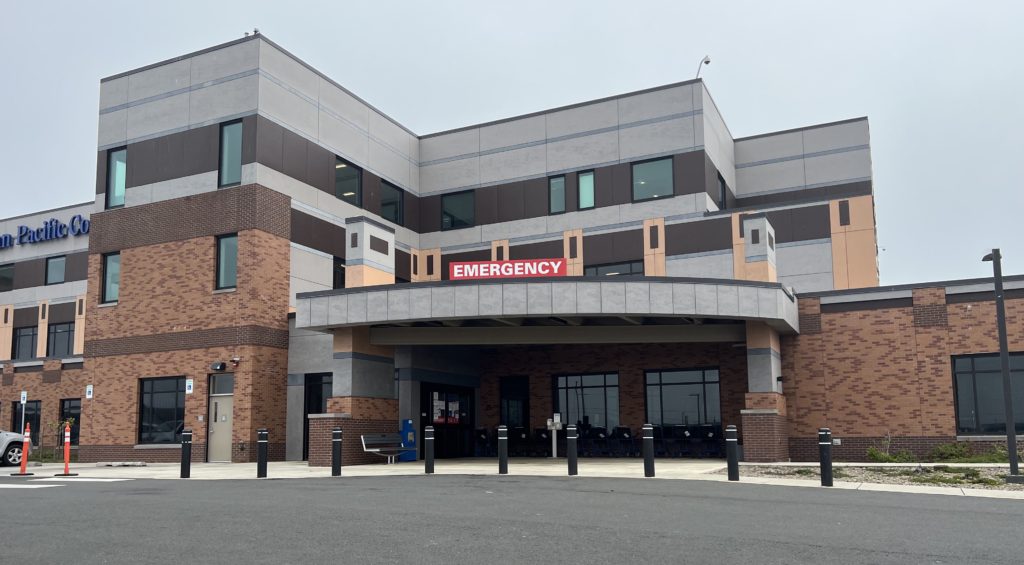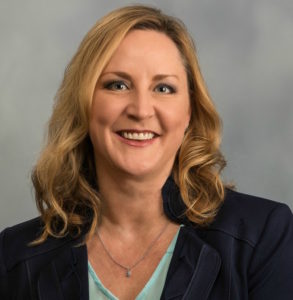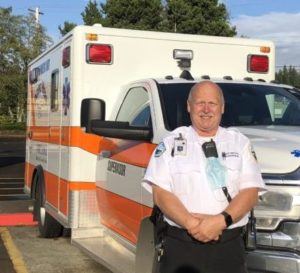
By QUINTON SMITH/YachatsNews.com
Four times a day, on average, a patient at one of Samaritan Health System’s two Lincoln County hospitals needs to be moved quickly to a hospital in the Willamette Valley or Portland that can provide a higher level of care.
More and more frequently, ambulance providers in or near the county cannot immediately respond, leaving patients waiting sometimes for hours to be moved.
It’s become such a problem, that Samaritan recently asked emergency service providers if they would be interested in setting up and staffing a special ambulance service committed to moving patients from its hospitals in Newport, Lincoln City, Lebanon, Albany and Corvallis to higher-level care hospitals in Springfield, Salem, Portland or sometimes even Seattle or Boise.
Samaritan found no takers for a system-wide service and is now breaking it down to see if a company can help its two Lincoln County hospitals and someone else handle the three hospitals in the Willamette Valley.
But Samaritan’s problem is not limited to Lincoln County or Benton or Linn counties where it has hospitals.

Hospitals and ambulance companies across Oregon and the country continue to struggle with staffing – resulting in a shortage of care in hospitals and a shortage of paramedics to drive ambulances.
“The pandemic did a number on our workforce; people left healthcare for so many different reasons than they used to,” said Dr. Lesley Ogden, chief executive officer of Samaritan’s two hospitals in Lincoln County. “And we can’t really tell when this is going to turn around and we return to adequate staffing levels.
“We really need some additional resources for inter-facility transfers,” Ogden told the county’s Ambulance Service Review Committee last week.
More staff on the way
Pacific West Ambulance has contracts with Lincoln County to provide 9-1-1 ambulance service to all of the county except for the Yachats area, which is handled by the private, nonprofit South Lincoln Ambulance and staffed by Yachats Rural Fire Protection District firefighter/medics.
Under those contracts, PacWest and South Lincoln are required to respond to 9-1-1 calls in their service areas. But they are not required to transport hospital patients from the coast to the valley or elsewhere, unless they can ensure local coverage while an ambulance is out of the area for three to six hours.
South Lincoln Ambulance has stopped transporting patients into the valley because of staffing issues.
If there is adequate staff, inter-facility transports can be good business for ambulance companies – which charge up to $1,500 per call and $21 per mile.
Until early 2022 PacWest had five ambulances with paramedics on board covering Otis to Waldport during the day and four at night. Lack of staff forced it to drop down to four during the day, with one ambulance having two emergency medical technicians on board instead of a paramedic — which changes the types of calls it can respond to.
PacWest general manager Jeff Mathia told the ambulance review committee last week that is changing. Beginning this week, he said, PacWest will be able to staff five advanced life support ambulances in Lincoln County during the day.
It should be able to staff a sixth ambulance by the end of December, Mathia said, and there is a possibility of a seventh ambulance in service by the busy summer season.
Mathia told YachatsNews the company has been bringing in more temporary, contract paramedics from other areas – similar to the highly-paid contract nurses that hospitals now rely on heavily. PacWest is also paying for college training for paramedics who commit to working for it – and some of those people are finishing up their programs and coming to work.
“… we need to solve this”
If patients need a higher level of treatment at other Oregon facilities, the hospitals in Newport and Lincoln City want their patients moved as fast as possible to free up space in their emergency departments or inpatient rooms.
But because Willamette Valley hospitals have been under similar staffing strains, Mathia says PacWest crews were being asked to drive farther and farther.

In July, PacWest notified Samaritan it would take hospital patients only as far as Corvallis or Salem — and not to Portland or Eugene/Springfield unless there was advance notice.
Mathia told YachatsNews that before pandemic-related staffing issues, PacWest transported 90 to 110 patients a month from Newport or Lincoln City to hospitals elsewhere, sometimes as far north as Vancouver, Wash. or south to Roseburg. Now it’s down to about 60 a month, he said.
“It’s really not ‘no’ all the time,” he said.
The tension occurs, Mathia said, when Samaritan supervisors call PacWest and ask for a patient transport. Previously, PacWest had 90 minutes to refuse the offer. But that is no longer the case and Samaritan can now call companies outside the area to see if they have an ambulance available.
Mathia said he met with Samaritan officials and offered to have one call center in the county handle transport requests. That didn’t work out.
“There’s times when we get the patient right out and there’s times when they’re going to have to wait awhile,” he said.
And that’s what spurred Samaritan’s search this fall for other alternatives.
“Without blame or animosity, we wanted to see who out there might help us,” Ogden told YachatsNews this fall. “They have the ambulances, they just need the staff. I do not envy them. But we wanted to see if there was another solution other than just waiting. For the safety of our patients, we need to solve this.”
The issue may get mostly resolved, Mathia said last week, if PacWest is able to staff the sixth ambulance by the end of the year. It could even allow out-of-area transports to Portland and Eugene, he said.
“Finding qualified personnel remains a big challenge,” he told the review committee last week. “But we’re trying to think outside the box … and get enough staffing so that the system works for everyone.”
- Quinton Smith is the founder and editor of YachatsNews.com and can be reached at YachatsNews@gmail.com


